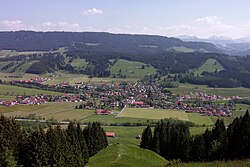Weitnau
| Weitnau | ||
|---|---|---|

View of Weitnau from the Sonneck, Hauchenberg in the background
|
||
|
||
| Coordinates: 47°39′N 10°8′E / 47.650°N 10.133°ECoordinates: 47°39′N 10°8′E / 47.650°N 10.133°E | ||
| Country | Germany | |
| State | Bavaria | |
| Admin. region | Schwaben | |
| District | Oberallgäu | |
| Municipal assoc. | Weitnau | |
| Government | ||
| • Mayor | Alexander Streicher (Ind.) | |
| Area | ||
| • Total | 65.22 km2 (25.18 sq mi) | |
| Population (2015-12-31) | ||
| • Total | 5,193 | |
| • Density | 80/km2 (210/sq mi) | |
| Time zone | CET/CEST (UTC+1/+2) | |
| Postal codes | 87480 | |
| Dialling codes | 08375 | |
| Vehicle registration | OA | |
| Website | www.weitnau.de | |
Weitnau is a municipality in the rural district Oberallgäu in Bavaria/Germany. Together with the neighboring municipality of Missen-Wilhams, Weitnau shares an administrative unit.
Weitnau is situated in the Allgäu region in the foothills of the Bavarian Alps. The municipality consists of the town Weitnau and the villages of Seltmans, Sibratshofen, Kleinweiler, Hellengerst, Rechtis and Wengen; in addition to that there are several small hamlets, most notably Waltrams, Gerholz, Engelhirsch, Eisenbolz, Ettensberg, Klausenmühle and Weilerle. The town Weitnau lies in a valley bordered to the north by the Sonneck mountain (elev. 1109 m.) and to the south by the Hauchenberg mountain (elev. 1243 m.). The stream Weitnauer Bach has its source in the east of the municipality's area and flows into the 49 miles long river Argen in Seltmans. The Argen river itself flows into Lake Constance and thus is a tributary to the river Rhine, one of Germany's major rivers.
The name Weitnau is derived from the earliest names given to settlements in the valley. Such names can be traced back to the 8th century A.D. when a settlement in the Weitnau valley was referred to as "Witunavia", possibly an Old High German name. The prefix "witun" might be traced back to Old High German "wittan" meaning "to widen" or "make wider"; the suffix "avia" might be traced back to the Old High German "awia" meaning "land by the water". Thus Witunavia can roughly be translated to "broad pastures by a stream", a term which certainly does justice to a small stream settlement in a wide valley. Over the centuries the term was shortened and the suffix changed first to "Witenowe" - possibly Middle High German as the new suffix "owe" suggests - in the 12th century. Then to Weitnaw by the 16th century and Weüttnau by the 18th century. Around 1834 Weitnau was finally referred to as "Weidnau".
1200 - 800 BCE, Illyrians from the east and Veneti from the west started settling in the Allgäu. Argen is an Illyrian name and probably means "forest stream". In 90 CE, the Roman road from Cambodunum (Kempten) to Brigantium (Bregenz) led through the Wengen valley, where a Roman milestone was found in 1500.
It is believed that Weitnau was mentioned for the first time in 726 as "Witunavia". It is certain that in 1250 Weitnau was mentioned as "Witenove".
Before it was ceded to Bavaria under the peace treaties of Brünn and Pressburg in 1805, Weitnau belonged to the Austrian House of Bregenz-Hohenegg. As early as in the 13th century, Weitnau was an administrative center, the legal domicile of the House of Bregenz-Hohenegg and enjoyed the right to hold a market. In 1760, the last execution took place when a certain Lukas Bentele a "petty thief and idler" was decapitated by executioner Jakob Räß.
...
Wikipedia



